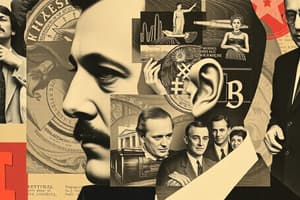Podcast
Questions and Answers
Who developed the psychoanalytic personality theory?
Who developed the psychoanalytic personality theory?
- Katherine Cook Briggs
- Isabel Briggs Myers
- Sigmund Freud (correct)
- Gordon Allport
What is the focus of the Trait Theory of personality?
What is the focus of the Trait Theory of personality?
- The follower's traits
- The organization's culture
- The interaction between leader and follower
- The leader's traits (correct)
What is the main idea of the Situation Strength Theory?
What is the main idea of the Situation Strength Theory?
- The way personality translates into behavior depends on the strength of the situation (correct)
- Personality is a biological characteristic
- Personality is developed through self-growth
- Personality is shaped by parental influences
What is the main focus of the Humanistic Personality Theory?
What is the main focus of the Humanistic Personality Theory?
What is learning, according to the text?
What is learning, according to the text?
What do personality theories address?
What do personality theories address?
What is the main assumption of the Trait Theory?
What is the main assumption of the Trait Theory?
Who developed the Humanistic Personality Theory?
Who developed the Humanistic Personality Theory?
What is the primary definition of learning?
What is the primary definition of learning?
What is the main advantage of organizational learning?
What is the main advantage of organizational learning?
What is a key feature of learning in organizational behavior?
What is a key feature of learning in organizational behavior?
According to classical conditioning theory, how are behaviors learned?
According to classical conditioning theory, how are behaviors learned?
What is the primary focus of operant conditioning theory?
What is the primary focus of operant conditioning theory?
What is the primary concept in cognitive theory?
What is the primary concept in cognitive theory?
How many basic types of learning theory are mentioned in the text?
How many basic types of learning theory are mentioned in the text?
What is one of the benefits of organizational learning?
What is one of the benefits of organizational learning?
What is the purpose of using personality tests in hiring decisions?
What is the purpose of using personality tests in hiring decisions?
What is the heredity approach to personality?
What is the heredity approach to personality?
What is personality, according to the text?
What is personality, according to the text?
What is the most common means of measuring personality?
What is the most common means of measuring personality?
What do personality traits refer to?
What do personality traits refer to?
Why is understanding individual differences in personality traits important?
Why is understanding individual differences in personality traits important?
What is the role of personality in shaping organizational behavior?
What is the role of personality in shaping organizational behavior?
What do self-report surveys measure?
What do self-report surveys measure?
Flashcards are hidden until you start studying
Study Notes
Personality Theories
- There are five main personality theories: Psychoanalytic, Humanistic, Trait, Situation Strength, and others.
- These theories address whether personality is a biological or environmentally developed characteristic.
Psychoanalytic Theory
- Developed by Sigmund Freud, who believed personality is a summary of essential characters and parental influences.
- According to Freud, nature and nurture work together to form a complete personality.
Humanistic Theory
- Developed by Katherine Cook Briggs and Isabel Briggs Myers.
- Focuses on the importance of self-growth to develop healthy personality traits.
Trait Theory
- Developed by Gordon Allport.
- Proposes that leader traits are central to organizational success.
- Assumes that finding people with the right traits will increase organizational performance.
Situation Strength Theory
- States that the way personality translates into behavior depends on the strength of the situation.
- The degree to which norms, signs, or standards test appropriate behavior.
Learning
- Defined as a change in behavior as a result of experience or practice, and gaining knowledge.
- Concerns both work and attitude.
Personality and Learning
- Personality refers to the unique traits, thoughts, feelings, actions, and characteristics of an individual.
- Personality is an active concept that describes the growth and development of a person's whole psychological system.
- Understanding individual differences in personality traits is critical for effective management and organizational success.
Measuring Personality
- Managers use personality tests, such as self-report surveys, to forecast who is best for a job.
Factors of Personality
- Debate about whether personality is the result of heredity or environment.
- Heredity approach argues that personality is partly due to genetic structure.
- Learning can be defined as a permanent change in behavior due to direct and indirect experience.
Importance of Learning in Organizational Behavior
- Allows organizational team members to continue professional growth and development.
- Helps business leaders ensure their team develops a broad range of knowledge and information.
- Helps understand and predict human behavior at work.
- Helps manage diversity and adopt changing technology.
- Facilitates organizational change and development.
Features of Learning in Organizational Behavior
- Involves a change in behavior.
- Must be permanent, not temporary.
- Is a continuous process.
- Must be based on practice or experience.
Theories of Learning in Organizational Behavior
- Four basic types of learning theory: Classical Conditioning, Operant Conditioning, Cognitive, and others.
- Classical Conditioning: behaviors are learned by connecting a neutral stimulus with a positive one.
- Operant Conditioning: behavior depends on rewards or punishments.
- Cognitive Theory: learning through active and constructive thought processes.
Studying That Suits You
Use AI to generate personalized quizzes and flashcards to suit your learning preferences.




